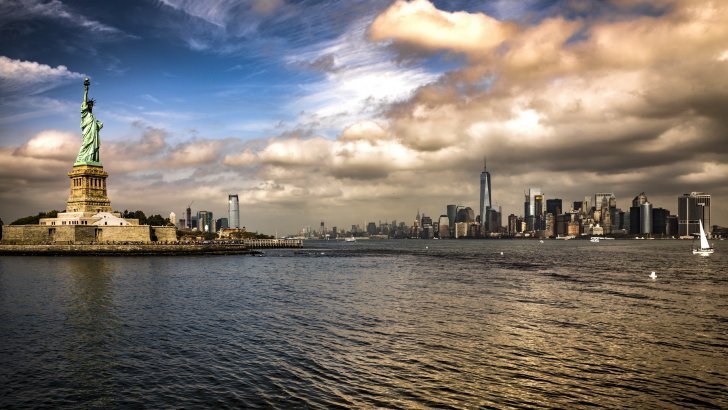Estatua de la Libertad, es uno de los monumentos más famosos de Nueva York, de los Estados Unidos y de todo el mundo. Se encuentra en la isla de la Libertad al sur de la isla de Manhattan, junto a la desembocadura del río Hudson y cerca de la isla Ellis. La Estatua de la Libertad fue un regalo de los franceses a los estadounidenses en 1886 para conmemorar el centenario de la Declaración de Independencia de los Estados Unidos y como un signo de amistad entre las dos naciones. Fue inaugurada el 28 de octubre de 1886 en presencia del presidente estadounidense de la época, Grover Cleveland. La estatua es obra del escultor francés Frédéric Auguste Bartholdi y la estructura interna fue diseñada por el ingeniero Alexandre Gustave Eiffel. El arquitecto francés Eugène Viollet-le-Duc se encargó de la elección de los cobres utilizados para la construcción de la estatua. El 15 de octubre de 1924, la estatua fue declarada como monumento nacional de los Estados Unidos y el 15 de octubre de 1965 se añadió la isla Ellis. Desde 1984 es considerada Patrimonio de la Humanidad por la Unesco.
La Estatua de la Libertad, además de ser un monumento importante en la ciudad de Nueva York, se convirtió en un símbolo en Estados Unidos y representa, en un plano más general, la libertad y emancipación con respecto a la opresión. Desde su inauguración en 1886, la estatua fue la primera visión que tenían los inmigrantes europeos al llegar a Estados Unidos tras su travesía por el océano Atlántico. En términos arquitectónicos, la estatua recuerda al famoso Coloso de Rodas, una de las «siete maravillas del mundo». Fue nominada para las «nuevas maravillas del mundo», donde resultó finalista. El nombre asignado por la Unesco es «Monumento Nacional Estatua de la Libertad». Desde el 10 de junio de 1933 se encarga de su administración el Servicio de Parques Nacionales de los Estados Unidos.
Statue of Liberty
Statue of Liberty, is one of the most famous monuments in New York, the United States and around the world. It is located on Liberty Island south of Manhattan Island, next to the mouth of the Hudson River and near Ellis Island. The Statue of Liberty was a gift from the Americans in 1886 to commemorate the centennial of the Declaration of Independence of the United States and as a sign of friendship among nations. It was inaugurated on October 28, 1886 in the presence of the American president of the time, Grover Cleveland. The statue is the work of the French sculptor Frédéric Auguste Bartholdi and the internal structure designed by engineer Alexandre Gustave Eiffel. The French architect Eugène Viollet-le-Duc was in charge of the choice of copper used for the construction of the statue. On October 15, 1924, the statue was declared a national monument of the United States and on October 15, 1965 Ellis Island was added. Since 1984 it is considered a World Heritage Site by Unesco.
The Statue of Liberty, in addition to being an important monument in New York City, became a symbol in the United States and represents, on a more general level, freedom and emancipation with respect to oppression. Since its inauguration in 1886, the statue was the first vision that European immigrants had when arriving in the United States through their journey across the Atlantic Ocean. In architectural terms, the statue recalls the famous Colossus of Rhodes, one of the "seven wonders of the world". She was nominated for the "new wonders of the world", where she was a finalist. The name assigned by Unesco is «National Monument Statue of Liberty». Since June 10, 1933, the National Parks Service of the United States has been responsible for its administration.
